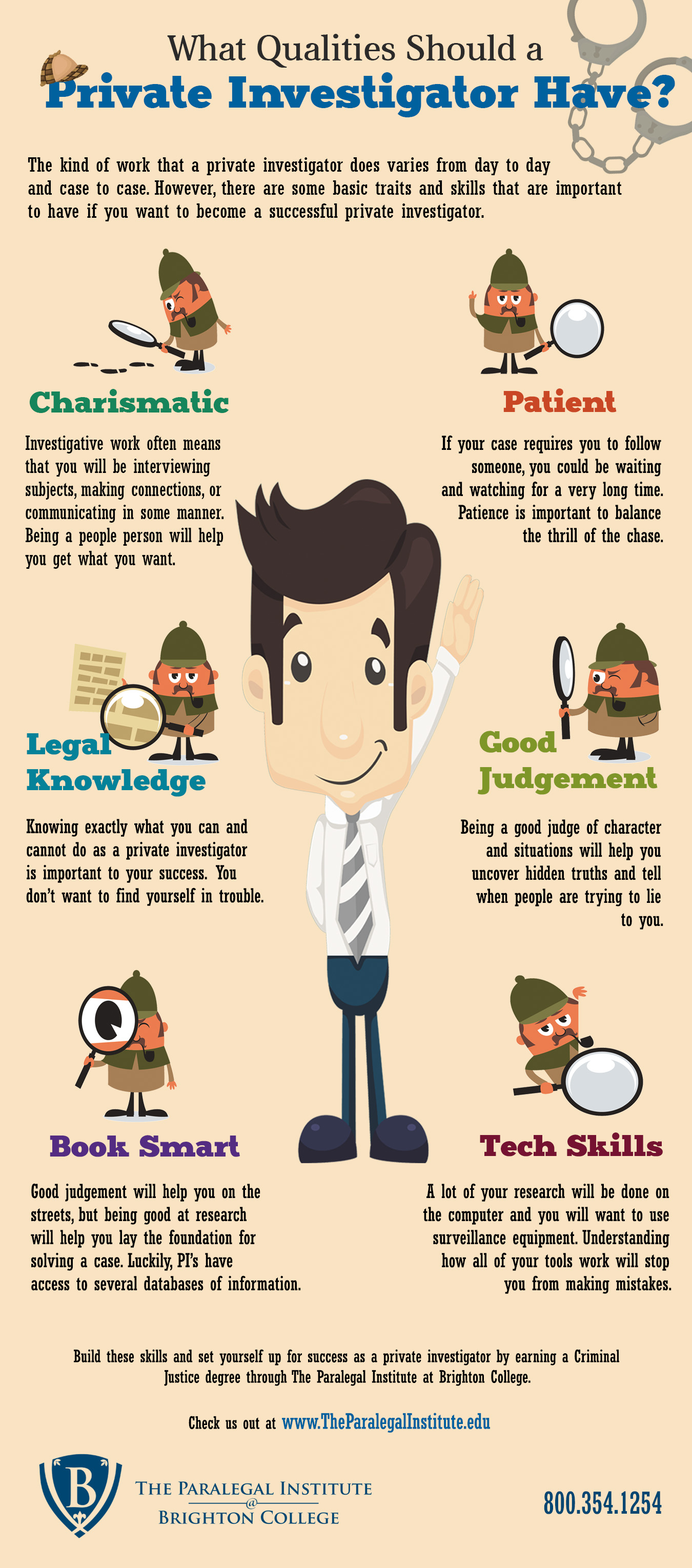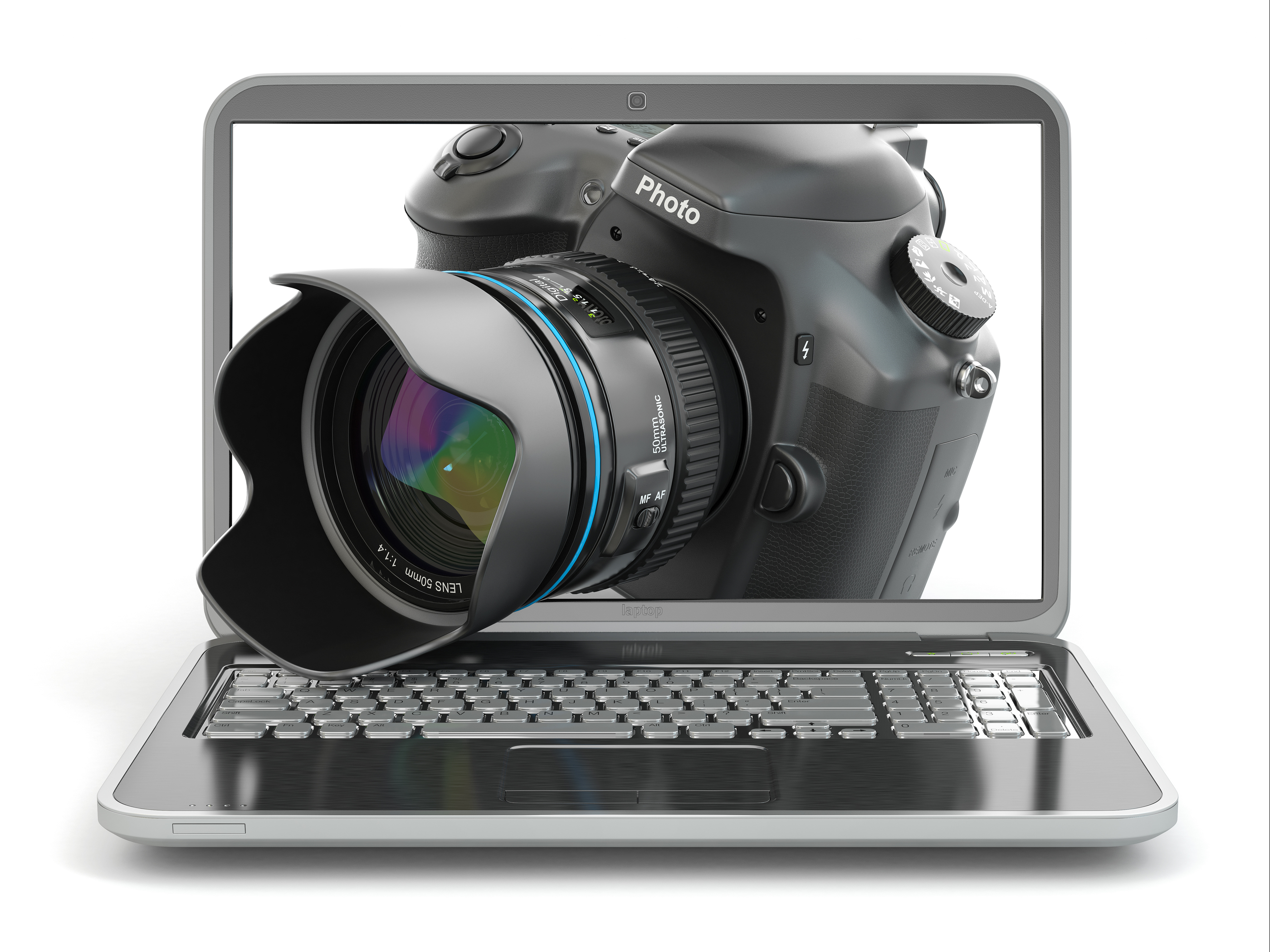

Tag: private investigator
What Qualities Should a Private Investigator Have?

The kind of work that a private investigator does varies from day to day and case to case. However, there are some basic traits and skills that are important to have if you want to become a successful private investigator.
Build these skills and set yourself up for success as a private investigator by earning a Criminal Justice degree through The Paralegal Institute at Brighton College. Get in touch with us at 800.354.1254.
Embed This Image On Your Site (copy code below):
How to Become a Private Investigator

Do you have an inquisitive mind? An interest in law and order? An affinity for justice and a proactive approach to problem solving? If you answered yes to those questions, then you are someone who should consider a career in private investigation. Private investigation is not what you might think; it doesn’t all involve surveillance of cheating spouses or recovering stolen artifacts of great value. It’s a booming professional field which goes far beyond simple domestic investigations and offers jobs across a wide range of businesses and law enforcement agencies. It’s a career that can take you from anti-terrorism to computer crimes to human trafficking to working as corrections officer or an insurance investigator.In other words, a career in private investigation offers many different options and directions for you to choose from and that makes it a flexible, multifaceted and rewarding career choice. Even though you may not wind up slinking down dark rain-slicked alleyways in a slouch hat and a trench coat, you will be asked to call on your skills and training to solve sometimes intricate puzzles that no one else has solved.If this is the kind of challenge that grabs your attention then here’s some information that will help you get on the road to becoming a private investigator.
Before doing anything else, evaluate objectively what kind of temperament you have. A good p.i. has to be a good communicator and an even better listener. You are observant and analytical, and have a knack for reading subtext in conversations, understanding body language and assessing degrees of truthfulness. You’ve got a strong personal moral compass and can work independently. You are able to remain objective and you produce results that are fact-based.
If this sound like a good fit for you, your first official step will be to acquire the knowledge and training you’ll need, since becoming a private investigator is not quite as simple as hanging out a shingle and waiting for clients to walk in.
A Criminal Justice diploma from the Paralegal Institute at Brighton College requires eight core classes (30 units). The program provides the student with an comprehensive overview of the field and with specific classes geared towards gaining an understanding of the different areas of the criminal justice system. Introduction to Criminal Justice provides the overview and the other seven classes concentrate on specifics in Constitutional Law, Criminal Law, Criminal Procedures, Criminal Investigations, Ethics, Corrections and Juvenile Delinquency.
After you have successfully completed the courses, there’s a good chance you will also need a state license to practice. Over 40 states now require them and the  states that don’t often allow individual counties and cities to have their own licensing requirements.
states that don’t often allow individual counties and cities to have their own licensing requirements.
These licensing requirements can differ from state to state, so check with your state to see what they require. There are some general requirements that most of them have in common. Most want proof of a high school diploma or equivalent GED and for the applicant to meet an age minimum which can vary from state to state; to have a record that is free of felony convictions; to have had either industry experience or education; and to have proof of legal citizenship or residency.
After you’ve gotten your diploma and met your state’s licensing requirements, you are ready to get into the field. You will be qualified to accept entry level positions with a great many law enforcement agencies and private corporations. And in your work you will notice that there are many law enforcement officers and lawyers who possess the same degree you have, because it’s a useful and applicable tool for anyone who is involved in the field of investigation.
If you join a law enforcement agency or a very large corporation – like a national insurance agency or a bank that has its own fraud investigation unit – you will probably have access to any equipment you might need in your investigations. If you decide to join a small agency or to work for yourself, you will want to invest in some basic surveillance equipment like video and digital cameras, recording devices, gps trackers, a charger or backup battery and binoculars. There is a vast array of tools that can be used during investigations, but at first it’s better to just stick to the basics and avoid extra expenses on equipment that you may or may not ever use.
Private investigators can work in a varying capacities including personal protection, employee screening, computer forensics, insurance fraud, industrial espionage, retail loss, corrections, background checks, anti-terrorism and many more.
One growth area with an ongoing need for investigators is cyber-crime, which continues to expand and spawn endless varieties of global scams like identity theft, extortion, sports betting and child pornography. Given the limitless reach of the internet, there will undoubtedly continue to be a growing need for individuals with good investigative skills who can take on these difficult “invisible” crimes.
So whether you want to be a part of the global battles on trafficking or terrorism, you are fascinated by sophisticated fraud schemes or you really do want to be the next Sam Spade, there’s an investigation niche for you.
If you decide you want to advance once you are in the field or if you want to start out your investigative career with even more education under your belt, you can continue your online studies at Brighton College to earn a Criminal Justice Associates degree.